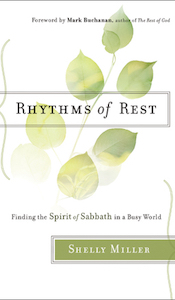Worshipping Through Rest
As we are different as individuals, our rhythms of rest will look different, too
Growing up in the 1980’s, Sundays were unlike any other day of the week. We arose early for church, spent the afternoon with friends and family, and took a leisurely nap before returning to church again in the evening. Even society treated the day differently as “Blue Laws” (banning the sale of unnecessary items on Sunday) were in effect.
2016 is a different world with regards to the observance of Sabbath rest in our culture. We are a civilization of constant busyness and chronic tiredness. A 24/7 lifestyle is not only expected but encouraged, and the church world is no exception.
Shelly Miller, who resources church planters in London, leads an online community whose sole purpose is to incorporate the intentional Sabbath into the daily and weekly lives of Christian believers. She encourages her readers that, while living a 24/6 lifestyle will lead to a more productive, rested and peaceful existence, the main motivation is to achieve a greater level of intimacy with the Creator who established intentional rest from the beginning.
While she doesn't address theological issues of Sabbath (day of observance, perpetual obligation vs. Christian liberty), Miller emphasizes the personal benefits of Sabbath to the whole person: spiritually, physically, emotionally and intellectually. Her basic premise is that Sabbath is a gift to God’s people for relationship; not a guilt-induced burden based upon either its lack of observance or its mode.
Miller advises that Sabbath is an individual gift and must, therefore, be crafted to each individual. While one person may find gardening to be “work,” and an interruption to Sabbath, others find it to be a break from labor and an act of worship. Rather than devising a list of rules for Sabbath, each person must determine for themselves what activities do, or do not, constitute rest and worship. Ultimately, Sabbath is focused on deepening the relationship with God, regardless of when or how it is kept.
Rather than devising a list of rules for Sabbath, each person must determine for themselves what activities do, or do not, constitute rest and worship.
Miller argues that Sabbath is one of God’s gifts to His people to increase their faith. Taking one day out of seven to rest and worship confronts our belief that we are indispensable and teaches us to embrace that it is God, not us, who is in control of the universe. She challenges the argument that one can only rest when all work is finished by encouraging the reader to learn to live with the “undones” of life, trusting that obedience to God is of far more value to Him than a completed “to-do” list. God is more concerned with “human beings” than “human doings.”
The author makes good use of the biblical “Day of Preparation” as the key component to Sabbath observance. By preparing in advance for the common necessities of the Sabbath (food, clothing, etc.), observers find the fulfillment of Christ’s promise that when we come to Him we find rest for our souls. When we attempt to enter Sabbath without preparation we do not find rest, but stress. If the car is full of gas, the clothes cleaned, and meals prepared in advance (she also recommends the use of paper plates instead of Sunday china), the family can move into their Sabbath with little fuss and rest more easily.
While the book is slower-paced in some areas and is often reminiscent of a personal journal, its descriptive prose is attractive to many readers. A broader discussion of the biblical Sabbath would be helpful to those less familiar with the concept. Readers who have a difficult time with personal revelations from God and mystical communication with the spirit world would find this book very off-putting. Those looking for a theology of the Sabbath would find themselves disappointed; however, a reader looking for encouragement and a partner in their spiritual journey toward rest would find a very refreshing travel companion in Miller.
In the end, Miller provokes us to consider what Sabbath keeping could mean to our 24/7 culture. In so many words, she asks the question, “What if there were a group of people who when asked, ‘How are you?’ responded with the simple phrase, ‘I am rested’?” Our overly tired, stressed out culture might find Christianity more attractive if it were made up of well-rested adherents who have incorporated the practice of keeping the Fourth Commandment.
 Book Reviewed: Shelly Miller, Rhythms of Rest: Finding the Spirit of Sabbath in a Busy World. (Grand Rapids, MI: Bethany House, 2016.)
Book Reviewed: Shelly Miller, Rhythms of Rest: Finding the Spirit of Sabbath in a Busy World. (Grand Rapids, MI: Bethany House, 2016.)
Influence Magazine & The Healthy Church Network
© 2025 Assemblies of God

